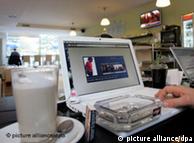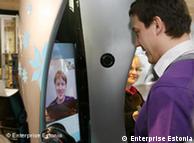Former Bulgarian foreign minister calls for 'EU WiFi paradise'
Solomon Passy describes his recent letter to the EU to expand Internet
access. He tells Deutsche Welle that wireless Internet access should be
as cheap and readily available as hot water or electricity.
Former
Bulgarian Foreign Minister Solomon Passy, and his wife, Gergana Passy,
the head of Pan-Europa Bulgaria, a pro-European non-profit organization,
published an open letter on June 20 to the European Commission calling
for Internet access to be made available to all Europeans.
In the letter, they
write that "access to Internet should be regarded as the newest, fifth
freedom of the EU, alongside the free movement of people, goods, capital
and services."
In an interview
with Deutsche Welle, Solomon Passy argues that commercial WiFi is
overpriced in Europe and that the EU needs to mandate it in new building
codes.
DW: Your open letter is called "EU WiFi Paradise.” Can you summarize what you're calling on the European Commission to do?
Solomon Passy: In
short, we would like to upgrade the Digital Agenda of the European Union
and transform the European Union into a WiFi paradise. What do we mean
by this? We want the European Commission to help us secure Internet
access to all public and private places.
We suggest that this be done in two stages. Stage one: to secure
universal Internet access in all public places and private houses. Stage
two: to guarantee universal access to the equipment to operate this
Internet service, namely, PCs, iPods and iPads and so on.
 Passy argued that WiFi access should be spread to all public spaces in the EUWe
are very much encouraged in our effort by the report adopted by the
United Nations [in May] in which Internet access was proclaimed as a
universal human right. This report was originally meant to stop
governments who want to prevent their respective peoples from using the
Internet. But this report of the UN has very, very strong implications
for the European Union. If the access to Internet is a universal human
right, then we should treat Internet access like access to hot water, or
access to restrooms, and things like that. We believe that it is
absolutely unacceptable to pay 15 or 20 euros per hour to use Internet
in a hotel in the heart of Europe. Passy argued that WiFi access should be spread to all public spaces in the EUWe
are very much encouraged in our effort by the report adopted by the
United Nations [in May] in which Internet access was proclaimed as a
universal human right. This report was originally meant to stop
governments who want to prevent their respective peoples from using the
Internet. But this report of the UN has very, very strong implications
for the European Union. If the access to Internet is a universal human
right, then we should treat Internet access like access to hot water, or
access to restrooms, and things like that. We believe that it is
absolutely unacceptable to pay 15 or 20 euros per hour to use Internet
in a hotel in the heart of Europe.
As you said, many Europeans may feel that wireless Internet access
is often overpriced, but should it be the job of the European
Commission or the EU to fund, setup and maintain WiFi hotspots? How
would this work in practice?
Yes, this is exactly the job of the European Commission and of
course, support from the European Parliament would be most welcome. We
have a lot of experience in this area. Three years ago, my wife and I
introduced a similar idea, namely, to standardized all mobile phone
chargers in the European Union. With the support of the European
Commission, this is a fact as of 2011.
We are planning to use this same know-how, asking the European
Commission to implement this UN report. In practical terms, we can
imagine that this will be done in exactly the same way in which we have
electricity in our hotel rooms all over Europe. When you go into a
hotel, they don't ask you to pay more for using the electricity, hot
water or the restroom.
 The letter outlines why the EU should support not just access, but equipment as wellWe're
talking about the universal access through equipment to use the
Internet, this is similar to the access that we have already with the
lamps and TV sets that we have in our hotel rooms. They don't tell you
that we'll provide you with electricity, but you have to bring your own
lamp or your own television. The letter outlines why the EU should support not just access, but equipment as wellWe're
talking about the universal access through equipment to use the
Internet, this is similar to the access that we have already with the
lamps and TV sets that we have in our hotel rooms. They don't tell you
that we'll provide you with electricity, but you have to bring your own
lamp or your own television.
The Internet should be treated exactly the same as electricity and
hot water, or cable and satellite television access, which is available
all across the territory EU.
You say here in your letter that "PCs, iPads, and laptops should
be made available in public areas.” In your vision, if someone was to
come to a public square in Sofia, what would you like me to have access
to in a public space?
You could have a small booth - which already exists in some airports
in Europe - and you could make use of this facility, or in every
cafeteria, in every restaurant, in every school, in every hospital -
there wouldn't be long queues [because there would be so much access].
Or imagine if you enter a plane, and you can have it on the back seats
in front of you.
European Union funding for WiFi hotspots will be expensive. Do you have any sense of what this will cost to implement?
 Passy wants more public Internet kiosks, like this Skype terminal in Tallinn AirportThis
will be done on a step-by-step basis. To start with, we can set a new
standard for private houses. Just as we don't issue permits for building
that don't have electricity or hot water, we would not issue permits
for a new house that does not include plans for WiFi. Of course it will
be paid, but the price will be much, much lower when the number of
consumers increase 10 or 100 times. Passy wants more public Internet kiosks, like this Skype terminal in Tallinn AirportThis
will be done on a step-by-step basis. To start with, we can set a new
standard for private houses. Just as we don't issue permits for building
that don't have electricity or hot water, we would not issue permits
for a new house that does not include plans for WiFi. Of course it will
be paid, but the price will be much, much lower when the number of
consumers increase 10 or 100 times.
So you're saying if there are more consumers the price will drop?
Yes. Imagine if you have a huge building with 500 apartments and only
two or three families were using electricity. Imagine the high price
that these people would have to pay. Then imagine the price that we all
have to pay when we are sharing the infrastructure.
We believe that this is just the beginning of a new digital era in
the European Union and which will be contagious for the rest of the
world.
Interview: Cyrus Farivar
Editor: Sean Sinico
http://www.dw-world.de/dw/article/0,,15197572,00.html
| 








